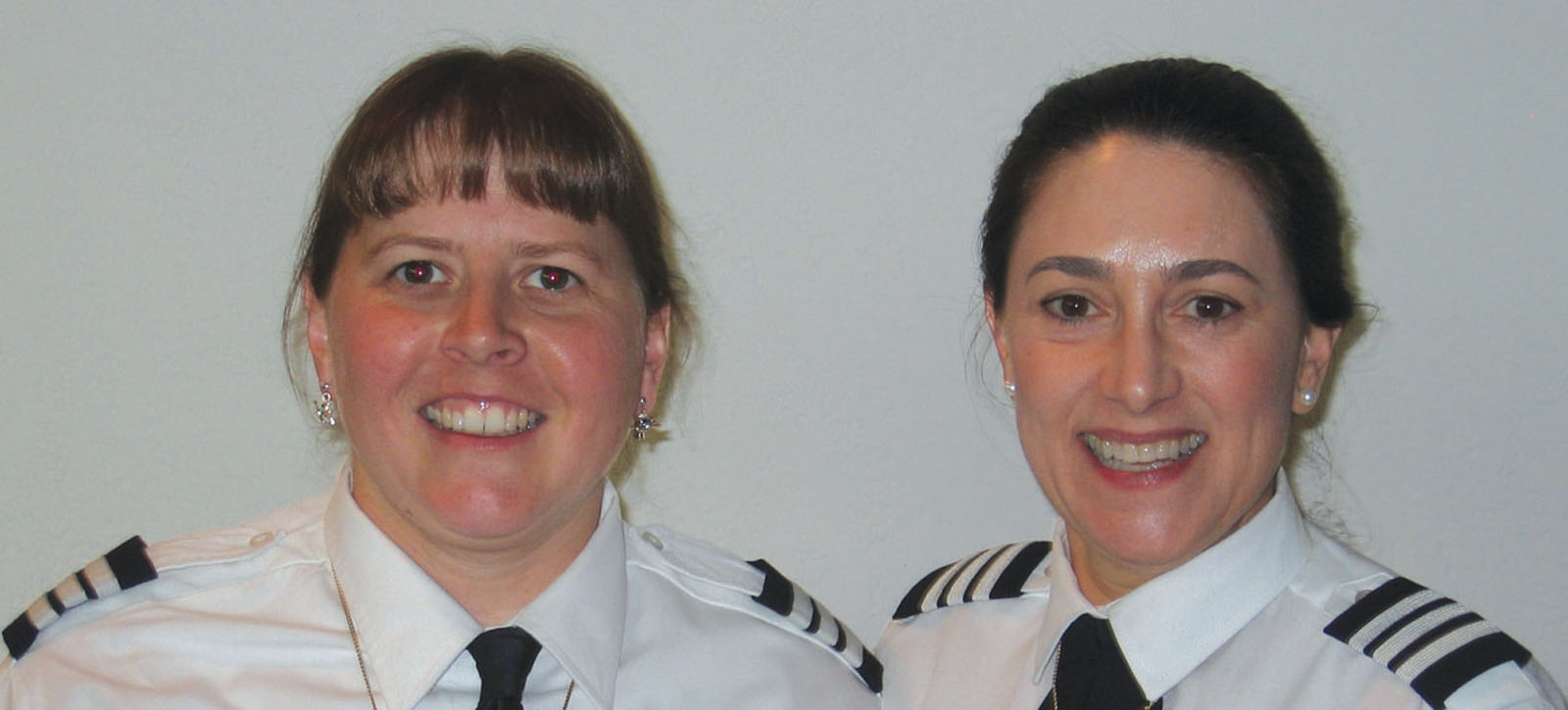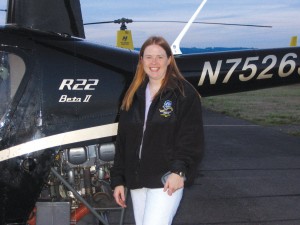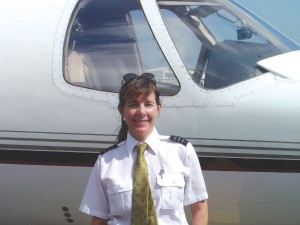By Henry M. Holden
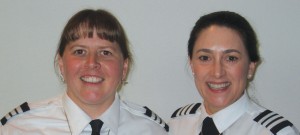
Laura Smith (left) and Jenny Beatty co-founded Professional Pilot Leadership Initiative. Smith, the program leader, is a pilot for Southwest Airlines. Beatty, an adviser to the PPLI, flies for American Airlines.
The Ninety-Nines Professional Pilot Leadership Initiative provides highly motivated Ninety-Nines members with tools to further develop their careers and leadership abilities. One aim of the international program is to help women increase the community of fellow pilots by sharing the skills learned in the PPLI with others who follow.
Conceived in 2003 by Jenny Beatty and Laura Smith, this biannual program is an opportunity for highly committed women pilots to receive mentoring, learn new career skills, share what they know and become active participants and leaders in the aviation community.
“I had just given a presentation on the Pro 99s Network before The Ninety-Nines annual convention in 2003 when Laura asked me if I had ever thought of developing a mentoring program,” explained Jenny Beatty. “I said I had, but it was something I couldn’t do alone.”
The two women compared notes, shared ideas and began developing the PPLI. Any 99s member who is pursuing a professional pilot career may apply. A student woman pilot who intends to pursue a professional piloting career, or a woman in any position in which she doesn’t feel she’s achieving her career goals can benefit from the guidance of the mentoring relationship this program provides. Applicants must be willing to sustain a commitment to the entire program of approximately 12 to 18 months and receive and give mentoring guidance.
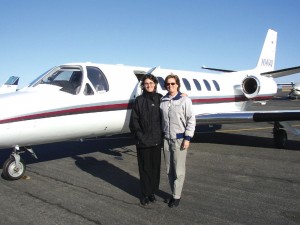
PPLI Captain Erin Recke (left) was thrilled to meet her senior navigator, Lucy Young, in person. Recke is a regional airline pilot. Young, a former Navy pilot, flies for US Airways.
“If she’s planning to begin a major time commitment, such as lengthy flight training or an addition to her family, or if she’s otherwise committed to a project, we urge her to delay her application until these commitments are fulfilled. It would be unfair to her or her mentor to interrupt the training cycle,” Beatty said.
Captain phase
The PPLI provides several phases of growth. The first is the captain’s phase, where a “navigator” mentors the individual while she also assumes aviation community leadership responsibilities. In real life, the captain is the pilot in command of her aircraft and crew and is ultimately responsible for the successful outcome of a flight. Similarly, in this initiative she’s in command of her career and responsible for its development.
“Similar to filing a flight plan, the 57 captains now in the program are required to file their career plans with an associated time line for the major events in the plan,” said Beatty.
Kathy Salm, a recent PPLI graduate, explained how well the process works for her.
“I’ve always been a self-starter,” she said. “However, the structure of having to actually write my plan down with a timeline was great!”
Every effort is made to match the captain with a navigator appropriate to her particular needs and goals. As captain, the individual will have the opportunity to learn from the experiences of her navigator, who will share her own knowledge and insights. The navigator will also provide additional appropriate guidance as the captain learns and grows in her career skills area.
“The mentoring process used in the PPLI is a relatively new process,” Beatty said. “In the old, open-ended corporate mentoring process the mentoring went on for years, with the mentored person learning but not sharing the new skills with others joining the company. Instead, the PPLI process defines the time and relationship between the mentor and the person being mentored, and the expectations at the end of the period.”
The structured mentoring session ends after five months. At that time, the individuals may continue in their mentoring relationship by mutual agreement, but this isn’t required.
“We’ve had women continue informally, and this is great because the synergy that they built can continue,” Beatty said.
The structured one-on-one mentoring from a more experienced pilot is designed to facilitate a transfer of knowledge, experience and support that will help reduce the learning curve and accelerate the captain’s career development. Especially helpful in this program is the ability to receive honest feedback from a mentor who has “been there and done that.”
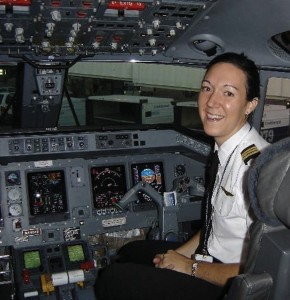
Monica Nielsen, a regional airline pilot, graduated from the PPLI program and is now a mentoring coordinator.
“It was fantastic to be able to help someone by passing along many hard-earned tips and insights,” Salm said.
Once a participant has completed her captain phase, the coordination team evaluates her progress in the program, her career status and the suitability of matching her to someone in the next group of captain-applicants. The captain will then be placed into her navigator phase, or she will participate in the captains’ circle.
“The captain’s circle is for women who for one reason or another aren’t ready for the navigator phase, or to mentor someone,” said Beatty. “She may have a lot going on in her life, or most likely, she isn’t yet working as a professional pilot or certified flight instructor. While she’s in the captain’s circle, she must continue her leadership activities.”
“The captain’s circle cheered me on with virtual pats on the back as I plowed through the last steps (toward her career goal),” Salm said. “That acknowledgement was psychologically and emotionally energizing.”
Leadership initiative
Developing future aviation leaders and leadership skills is at the heart of this program. With the leadership activities an individual undertakes during both her captain and navigator phases, she’ll develop leadership, managerial and organizational skills, and at the same time make valuable contributions to the aviation community.
“These days corporations aren’t hiring first officers,” said Salm. “They’re hiring future captains. We need to be good at being leaders.”
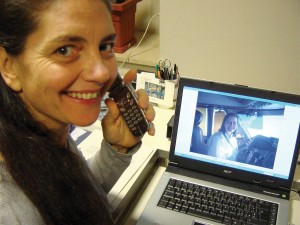
An aspiring professional pilot living in Rome and captain in the PPLI, Michele Bassanessi communicates by phone and email with senior navigator Thyra Blaom. Blaom lives in Auckland and is a second officer on the B747-400 for Air New Zealand.
Leadership is “learned” by doing. A participant will spend one to four hours per month on her leadership activities, which are self-directed. The person will choose her own activities and pacing, under the guidance of her navigator and the PPLI program team. She’ll be expected to provide regular written leadership activity reports on each activity.
Sharpening one’s leadership skills may come from: serving as a Ninety-Nines’ chapter chair or chapter careers chair, organizing flying events, conducting career presentations, writing articles on the PPLI, conducting safety seminars and more. In special cases, a participant may request guidance from the program team in developing activities more specific to her circumstances. Each activity and project is rated on a point system based on time, commitment and leadership level, and a targeted number of points are necessary for completion.
Navigator phase
After completing the captain’s phase or the captain’s circle, the individual usually moves on to become a navigator. This is where she’ll use the skills she’s learned as a captain to mentor and facilitate another woman along her captain’s path.
Monica Nielsen, a recent graduate of the PPLI, said that “interacting with the amazing women who give not only their time, but also their energy and spirit and wisdom,” allowed her to feel empowered to take the initiative to be a leader.
In the five-month navigator phase, the navigator is matched with a captain for whom her experience will be most beneficial. The navigator will pass along the mentoring guidance, support and encouragement she received as a captain, develop as a leader and learn by teaching others, much as flight instructors do. The navigator will also help her captain avoid mistakes, teach her to persevere through difficult times and help her focus on and reach her important goals. Fundamental to the program is a distance-mentoring concept.
“The mentoring partners don’t have to be in the same geographical location,” said Beatty. “Presently, there are participants from the U.S., Canada and Italy, and as far away as Auckland, New Zealand.”
In fact, it’s likely that captain and navigator partners won’t live near each other.
“In that case, the team is expected to use all available resources, including email, postal mail, telephone, and if they have high speed Internet connections, Web conferencing is possible,” Beatty said.
When possible, the mentoring team is urged to attend regional aviation events to communicate and interact with each other. This program is also about building networks. In both phases, the participants will have opportunities to build mutually beneficial relationships with others who may be in a position to help them in the future. This isn’t a job-placement program, however, and the mentor is a guide, not an “in” at a particular company.
“The PPLI initiated me into the ‘good old girls’ club,’ if you will,” said graduate Sabrina Valine. “I was able to finally make those all-important connections that are so valuable for mentorship and career advancement.”
Senior navigators
Professional pilots who feel they’re in a good position to mentor other pilots, or who have achieved career goals already or may be furloughed or retired are encouraged to participate in the PPLI as senior navigators.
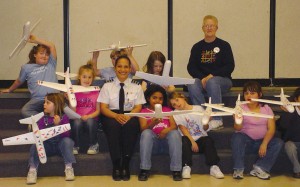
Becky Roman-Amador, a captain in the PPLI program and a regional airline first officer, talked to a Girl Scout troop as part of her leadership activities.
The PPLI offers an opportunity for them to share their expertise and enthusiasm with a woman pilot who can benefit from her senior navigator’s wide experience and expertise. There are currently 35 senior navigators in the program, with experience in diverse areas of aviation including corporate, military, bush, charter and helicopter pilots; flight instructors; astronauts; and flight school operators. The PPLI provides the senior navigator with a platform to share how she found success. A senior navigator has the option to be a mentor for one or more half-year sessions, and she isn’t expected to complete leadership activities.
“We like the individuals to have a block of time, a year at least, to commit to the program, because it takes time and effort to build mentoring partnerships and learn new skills,” said Beatty.
During the two five-month mentoring sessions of the captain and navigator phases, the program calls for a minimum of three communications per month between the mentoring partners. At least one of these must be a 20-30 minute telephone call (except when the mentoring partner is not in the same country). In addition, the partners will be asked to complete readings and exercises.
“As you can see, this isn’t a program that someone can just add to their already busy life. It involves a major time commitment,” said Beatty.
For further PPLI program information, visit [http://www.ninety-nines.org/careers].











